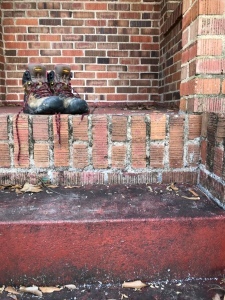Dirty Boots: Just Like Jim Stark’s Blues
 In her short essay “Facing the world on fire” in this month’s issue of The Christian Century, Rachel Mann discusses the idea of choosing contemplation as a response to our modern socio-political conflicts, even in the face of criticism that this choice is a retreat, avoidance, the opposite of the action that is sorely needed. Mann, who is an Anglican priest and theologian, reminds readers that the word contemplation has its roots in the Greek word theoria, which means watching or seeing. In fact, argues Mann, contemplation is not inaction at all; it is an aspect of taking action— it is allowing ourselves a moment to step back from the problems and the division to look again at the situation with the benefit of distance and silence.
In her short essay “Facing the world on fire” in this month’s issue of The Christian Century, Rachel Mann discusses the idea of choosing contemplation as a response to our modern socio-political conflicts, even in the face of criticism that this choice is a retreat, avoidance, the opposite of the action that is sorely needed. Mann, who is an Anglican priest and theologian, reminds readers that the word contemplation has its roots in the Greek word theoria, which means watching or seeing. In fact, argues Mann, contemplation is not inaction at all; it is an aspect of taking action— it is allowing ourselves a moment to step back from the problems and the division to look again at the situation with the benefit of distance and silence.
As I was reading it, Mann’s essay reminded me of the police-station scene at the beginning of Rebel without a Cause. Jim Stark (played by James Dean) has been arrested for public drunkenness, and when his parents and grandmother arrive, they bicker all around him until he screams, “You’re tearing me apart!” The frustrated police officer Ray Fremick then takes Jim into an adjacent room, and while Jim calms down with a cup of water, they watch through a small window as the trio go at it. Nothing good will happen in that wild foray, everyone angrily blaming each other in turn. It is by stepping away, into silence, to watch and to see, that Jim and Ray get the best perspective on what is really going on. In that little side room, the officer begins to understand the teenager’s predicament, and so do we.
I also remembered, at the peak of the Black Lives Matter movement, how I would see on social media, Twitter especially, the sentiment that everyone who is “silent” is complicit in the wrongdoing. That narrow and incomplete understanding of political action implies that the only way to accomplish anything is to yell about it. Public protests and social media posts certainly have their place in making change, but so do quieter actions like reading credible information sources and listening to varied perspectives, both of which involve watching or seeing. Action has its place, as do rhetoric and speech, but so does contemplative silence. When the world gets like Ray Fremick’s little office, with everybody packed in tight and shouting, it’s time to step away to gain some clarity.
For about twenty years, I counted myself among those who were taking action. Starting in 2001, when I went to work at NewSouth Books, I participated in organizing events, creating resources, educating people, and helping to tell neglected stories. The world didn’t ask me whether I wanted to step away from it in March 2020. A microscopically tiny organism burst onto the scene, infecting and killing people, and governments everywhere decided that we would all experience some distance and silence. At that time, my life was full of action: a grant-funded student project on a neglected local history, a Literary Arts Fellowship project on myths in Southern culture, and a commissioned historical monograph on a long-standing educational institution. Yet, instead of the vibrant activity that such projects usually involve, the pandemic insisted upon distance and silence— far more than I wanted! Like millions of Americans, I had no choice but to succumb, and I found myself filling the time and the space with contemplation. Some of that contemplation was enlightening, some of it was painful. When we returned fully to in-person school in August 2022, I had changed, so had everyone else— the world had changed. I didn’t understand it then and don’t now. I don’t think anyone does. Which is why contemplation is so important today.
In Rebel Without a Cause, Jim Stark learns that no one around him has the answers he is looking for. He knows that his parents move the family regularly to avoid dealing with their problems and that they buy him expensive gifts to pacify his troubled mind. Jim’s parents push him to embrace middle-class normalcy as the solution to his problems. The swarthy troublemaker Buzz, who leads the small gang of toughs, invites Jim into their life of daring and danger, only to die in the “chickie run” he himself arranged. Pretty young Judy first harries Jim with teasing and mind games, but moves after Buzz’s death into sincerity and what we hope is love. Poor sad Plato, who just wants a friend, is so distraught by loneliness that he commits what we call today “suicide by cop.” The best answer ends up coming from the solemn police officer Ray Fremick, who invites true contemplation by asking Jim to set aside what others want or expect to consider instead what he thinks. Though the stone-faced lawman is an unlikely mentor to this confused teenager, he encourages the one thing that no one else does: look inside yourself for what is right. For Jim, action does not produce an answer, but contemplation might.
In the Transtheoretical Model of making change, there are five stages. Contemplation is the second one. In the first stage Precontemplation, a person is either unaware that there is a problem or is unwilling to acknowledge that there is. Next, in Contemplation, one starts thinking that maybe something is not what it should be and really does need to change. In Preparation then, possible solutions are sought, and during Action, attempts are made implement what seem to be most viable solutions. Finally, in Maintenance, there comes the effort not to revert back to the old way. Giving a nod to the detractors that Rachel Mann alludes to, if a person hits the Contemplation stage and never moves on, then yes, it is a retreat or avoidance. That would be like knowing you have to pee and not walking to the bathroom. (Then you’d have an even bigger problem!) Contemplation is a necessary part of the process that should lead to action— hopefully, the best action.
In the year or so since the pandemic ended, and since I’ve finished two of those three projects I listed above, I’ve been hanging back and watching other people take action while I spend time on contemplation. The world has been changed by movements like Black Lives Matter and #metoo, by a years-long pandemic that killed millions of people and devastated the lives of millions more, and by a growing sense of urgency about the Earth’s climate. And I have been changed by disruptions, societal and personal, that have disallowed the continuation of the way I had lived and worked before. I’ve been mighty quiet in the last few years, so quiet in fact that people some ask me when I see them in public, whether I’ve been OK. It’s not like you, they say. Well, it’s like me now.
In her recent essay, Rachel Mann writes that contemplation is about “seeking to perceive the world as it is [as] a work of education in the truth.” After Jim Stark and Judy have experienced the deaths of Buzz then Plato, nothing will be the same for them. They have known two young men whose lack of direction in life led to their untimely deaths. That’s the truth that they are changed by and have to live with. Though I’m no longer a teenager, I still understand Jim’s frustration at people who say, Why can’t you just live and think like me? Especially after a life-changing events have made that impossible. Quiet contemplation undertaken without interruptions or disturbance is not avoidance; it is a form of healing, before we go out and take on life’s challenges again, and it is necessary to ensure that the action we take is right.



